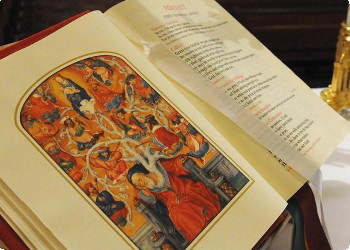SHE HAS CONTRIBUTED ALL SHE HAD
1 Kings 17,10-16; Ps 145; Heb 9,24-28; Mk 12,38-44
11 NOVEMBER
Deuteronomy established that before the Lord one did not have to present himself empty-handed. Instead, everyone had to offer his gift to the extent of God’s blessing.
“Three times a year, then, every male among you shall appear before the Lord, your God, in the place which he chooses: at the feast of Unleavened Bread, at the feast of Weeks, and at the feast of Booths. No one shall appear before the Lord empty-handed, but each of you with as much as he can give, in proportion to the blessings which the Lord, your God, has bestowed on you (Dt 16,16-17).
The woman is a widow and poor. She has little, almost nothing. She gives all her little and her nothing to the Lord. Jesus sees and tells his disciples that she has given more than any other. Every other gave of his superfluous. Instead she gave what she owned to live. This woman is a figure of Lord Jesus. He had nothing to offer his Father. He had only the body and offered it to him from the cross. Even too the man he offered everything he had: his body. He offered it to him in the Eucharist. Total gift to God and men.
Since the law has only a shadow of the good things to come, and not the very image of them, it can never make perfect those who come to worship by the same sacrifices that they offer continually each year. Otherwise, would not the sacrifices have ceased to be offered, since the worshipers, once cleansed, would no longer have had any consciousness of sins? But in those sacrifices there is only a yearly remembrance of sins, for it is impossible that the blood of bulls and goats take away sins. For this reason, when he came into the world, he said: “Sacrifice and offering you did not desire, but a body you prepared for me; holocausts and sin offerings you took no delight in. Then I said, ‘As is written of me in the scroll, Behold, I come to do your will, O God.'”
First he says, “Sacrifices and offerings, holocausts and sin offerings, you neither desired nor delighted in.” These are offered according to the law. Then he says, “Behold, I come to do your will.” He takes away the first to establish the second. By this “will,” we have been consecrated through the offering of the body of Jesus Christ once for all. Every priest stands daily at his ministry, offering frequently those same sacrifices that can never take away sins. But this one offered one sacrifice for sins, and took his seat forever at the right hand of God; now he waits until his enemies are made his footstool. For by one offering he has made perfect forever those who are being consecrated. The holy Spirit also testifies to us, for after saying: “This is the covenant I will establish with them after those days, says the Lord: ‘I will put my laws in their hearts, and I will write them upon their minds,'” he also says: “Their sins and their evildoing I will remember no more.” Where there is forgiveness of these, there is no longer offering for sin (Heb 10,1-18).
The poor and widowed woman is a figure of every person that consecrates his life to the kingdom. Just as Christ has only his body to offer to the Lord and offers it to him for the Gospel.
In the course of his teaching he said, “Beware of the scribes, who like to go around in long robes and accept greetings in the marketplaces, seats of honour in synagogues, and places of honour at banquets. They devour the houses of widows and, as a pretext, recite lengthy prayers. They will receive a very severe condemnation.” He sat down opposite the treasury and observed how the crowd put money into the treasury. Many rich people put in large sums. A poor widow also came and put in two small coins worth a few cents. Calling his disciples to himself, he said to them, “Amen, I say to you, this poor widow put in more than all the other contributors to the treasury. For they have all contributed from their surplus wealth, but she, from her poverty, has contributed all she had, her whole livelihood.”
If the Christian gave his body to God for the Gospel, but placing it entirely in the Gospel, the earth would be inundated with truth. Yet it takes very little for God to redeem the world: our nothingness, our emptiness. It would be enough for the young man to give his whole body to Christ and his work of salvation would produce many fruits.
Mother of God, Angels and Saints ensure that many young people give Christ the body for the Gospel.





